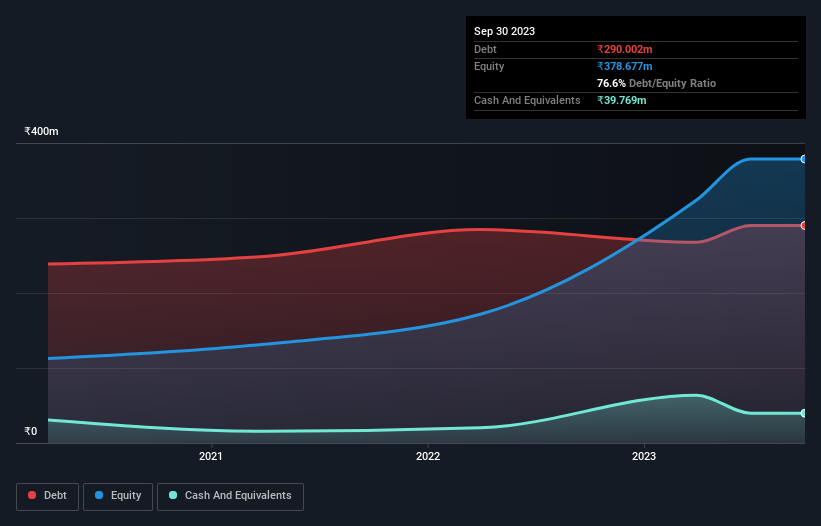- India
- /
- Professional Services
- /
- NSEI:IPSL
Is Integrated Personnel Services (NSE:IPSL) Using Too Much Debt?

Howard Marks put it nicely when he said that, rather than worrying about share price volatility, 'The possibility of permanent loss is the risk I worry about... and every practical investor I know worries about.' When we think about how risky a company is, we always like to look at its use of debt, since debt overload can lead to ruin. We can see that Integrated Personnel Services Limited (NSE:IPSL) does use debt in its business. But the more important question is: how much risk is that debt creating?
Why Does Debt Bring Risk?
Generally speaking, debt only becomes a real problem when a company can't easily pay it off, either by raising capital or with its own cash flow. In the worst case scenario, a company can go bankrupt if it cannot pay its creditors. While that is not too common, we often do see indebted companies permanently diluting shareholders because lenders force them to raise capital at a distressed price. Of course, plenty of companies use debt to fund growth, without any negative consequences. When we think about a company's use of debt, we first look at cash and debt together.
View our latest analysis for Integrated Personnel Services
What Is Integrated Personnel Services's Net Debt?
You can click the graphic below for the historical numbers, but it shows that as of September 2023 Integrated Personnel Services had ₹290.0m of debt, an increase on ₹267.6m, over one year. However, it also had ₹39.8m in cash, and so its net debt is ₹250.2m.

How Healthy Is Integrated Personnel Services' Balance Sheet?
The latest balance sheet data shows that Integrated Personnel Services had liabilities of ₹294.1m due within a year, and liabilities of ₹74.9m falling due after that. Offsetting these obligations, it had cash of ₹39.8m as well as receivables valued at ₹539.2m due within 12 months. So it actually has ₹210.0m more liquid assets than total liabilities.
This excess liquidity suggests that Integrated Personnel Services is taking a careful approach to debt. Given it has easily adequate short term liquidity, we don't think it will have any issues with its lenders.
We use two main ratios to inform us about debt levels relative to earnings. The first is net debt divided by earnings before interest, tax, depreciation, and amortization (EBITDA), while the second is how many times its earnings before interest and tax (EBIT) covers its interest expense (or its interest cover, for short). Thus we consider debt relative to earnings both with and without depreciation and amortization expenses.
Even though Integrated Personnel Services's debt is only 2.4, its interest cover is really very low at 2.4. This does have us wondering if the company pays high interest because it is considered risky. Either way there's no doubt the stock is using meaningful leverage. We note that Integrated Personnel Services grew its EBIT by 26% in the last year, and that should make it easier to pay down debt, going forward. There's no doubt that we learn most about debt from the balance sheet. But it is Integrated Personnel Services's earnings that will influence how the balance sheet holds up in the future. So if you're keen to discover more about its earnings, it might be worth checking out this graph of its long term earnings trend.
Finally, while the tax-man may adore accounting profits, lenders only accept cold hard cash. So it's worth checking how much of that EBIT is backed by free cash flow. Over the last three years, Integrated Personnel Services recorded negative free cash flow, in total. Debt is far more risky for companies with unreliable free cash flow, so shareholders should be hoping that the past expenditure will produce free cash flow in the future.
Our View
When it comes to the balance sheet, the standout positive for Integrated Personnel Services was the fact that it seems able to grow its EBIT confidently. However, our other observations weren't so heartening. To be specific, it seems about as good at converting EBIT to free cash flow as wet socks are at keeping your feet warm. When we consider all the elements mentioned above, it seems to us that Integrated Personnel Services is managing its debt quite well. Having said that, the load is sufficiently heavy that we would recommend any shareholders keep a close eye on it. There's no doubt that we learn most about debt from the balance sheet. But ultimately, every company can contain risks that exist outside of the balance sheet. For instance, we've identified 3 warning signs for Integrated Personnel Services (2 shouldn't be ignored) you should be aware of.
When all is said and done, sometimes its easier to focus on companies that don't even need debt. Readers can access a list of growth stocks with zero net debt 100% free, right now.
If you're looking to trade Integrated Personnel Services, open an account with the lowest-cost platform trusted by professionals, Interactive Brokers.
With clients in over 200 countries and territories, and access to 160 markets, IBKR lets you trade stocks, options, futures, forex, bonds and funds from a single integrated account.
Enjoy no hidden fees, no account minimums, and FX conversion rates as low as 0.03%, far better than what most brokers offer.
Sponsored ContentNew: AI Stock Screener & Alerts
Our new AI Stock Screener scans the market every day to uncover opportunities.
• Dividend Powerhouses (3%+ Yield)
• Undervalued Small Caps with Insider Buying
• High growth Tech and AI Companies
Or build your own from over 50 metrics.
Have feedback on this article? Concerned about the content? Get in touch with us directly. Alternatively, email editorial-team (at) simplywallst.com.
This article by Simply Wall St is general in nature. We provide commentary based on historical data and analyst forecasts only using an unbiased methodology and our articles are not intended to be financial advice. It does not constitute a recommendation to buy or sell any stock, and does not take account of your objectives, or your financial situation. We aim to bring you long-term focused analysis driven by fundamental data. Note that our analysis may not factor in the latest price-sensitive company announcements or qualitative material. Simply Wall St has no position in any stocks mentioned.
About NSEI:IPSL
Integrated Personnel Services
A human resource services company, engages in the provision of recruitment process outsourcing, and information technology and contract staffing services to various corporates in India.
Low with questionable track record.
Similar Companies
Market Insights
Community Narratives




